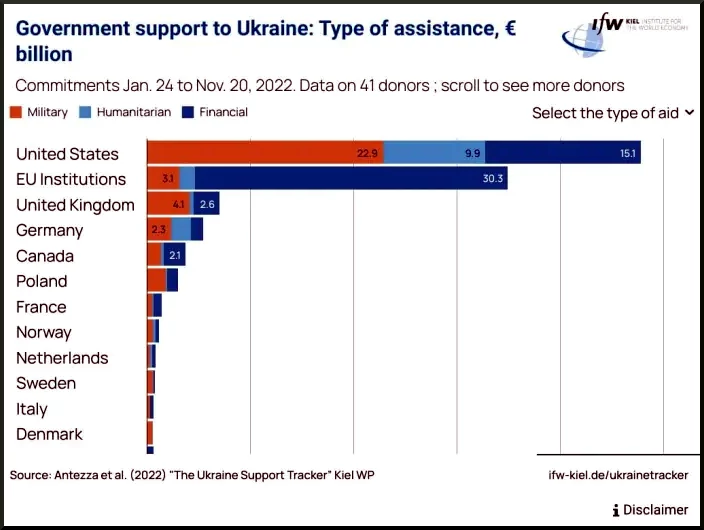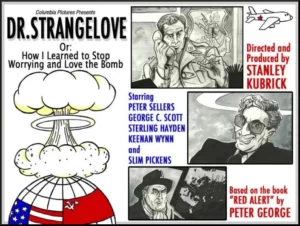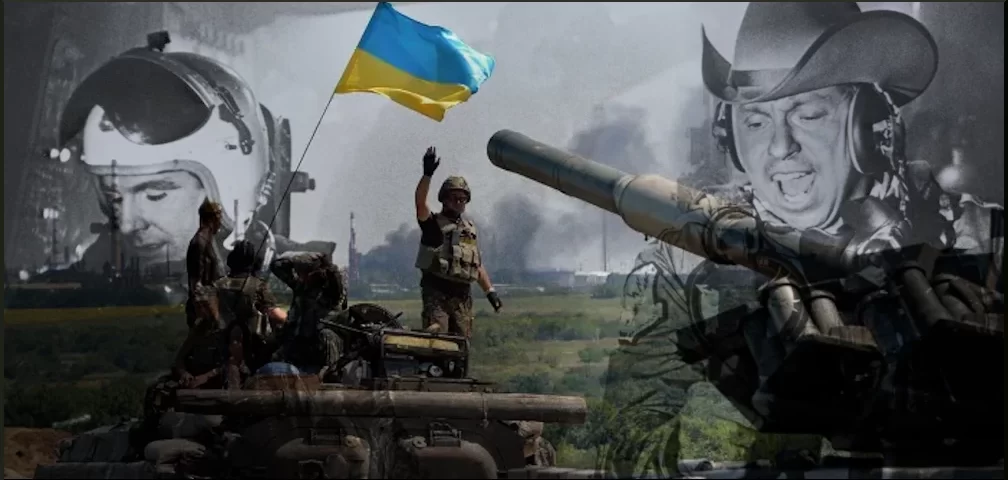by Dee Knight, published on CovertAction Magazine, March 1, 2023
Expansion of U.S. weapons supplies to Ukraine makes nuclear war more conceivable
“We are fighting a war against Russia,” German Foreign Minister Putin at Stalingrad Memorial on 80th anniversary. [Source: pbs.org] told the Council of Europe on January 24. The next day German Chancellor Olaf Scholz and U.S. President Joe Biden announced plans to send high-powered tanks to Ukraine, in a major escalation of the conflict.
“Germany has really stepped up,” Biden said, “and the chancellor has been a strong, strong voice for unity…and for the level of effort we’re going to continue.”
Biden said nothing about destruction of the Nord Stream pipelines last September, considered by many as a direct attack on its European “ally.” Other voices were not so united. Croatian President Zoran Milanovic commented at the Council of Europe meeting that “The German FM said we must be united because we are at war with Russia. I did not know that. Maybe Germany is at war with Russia again, then good luck to them, maybe it will turn out better than 70 years ago.”
World-renowned economist Jeffrey Sachs declared on January 25 that
“We are at the brink of a disaster…first and foremost because of the United States which is a major provocateur of this war, and a major threat to peace.” He made an impassioned plea to “get us off this reckless war between Russia and NATO, which is escalating by the day. The Doomsday Clock was moved to 90 seconds to midnight at the same time as the U.S. and Germany agreed to send new highly advanced tanks to Ukraine, in a guaranteed reckless escalation that brings us closer to nuclear war.”
Sachs said the conflict goes back more than 30 years to 1990, when the U.S. began to “pursue its unipolar agenda, moving its systems further east, with the idea of surrounding Russia.”
“Passing Germany the Poisoned Chalice”
A leader of Germany’s Left Party (Die Linke), Sevim Dagdelen said “This is obviously about passing Germany the poisoned chalice. Berlin is to be sent into the line of fire, to conclusively destroy German-Russian relations and turn them into open war for others’ benefit.” Dagdelen is the spokesperson for her party in the German Parliament’s Committee on Foreign Affairs.
Dagdelen’s view echoes economist Michael Hudson, who says the U.S. war against Russia is actually waged against Europe, to keep the European Union (EU) subordinated to U.S. capital. Hudson says the sanctions against Russia and China aim to prevent America’s allies from opening up more trade and investment with Russia and China, to “keep them firmly within America’s own economic orbit.” European industry has been shutting down recently as energy prices soar due to sanctions.
The German Left Party leader said delivering German tanks to Ukraine would “entail the greatest security threat to face the German population since the Second World War.” She added that “many Russians, especially those who lost loved ones in [WWII]…will see in these weapons a renewed German military campaign against their country.”
A large majority of Germans and other Europeans share these concerns. In a recent poll by Project Europe, more than two-thirds of respondents in the 27 countries of the EU think the conflict is “worrisome.”
Across Europe, more than 80% want negotiations, not continued war, the poll said. European public opinion reflects the impact of sanctions against Russia, which have had a “boomerang” effect, with skyrocketing inflation leading to near-depression conditions. Street protests and strikes across Europe have had an impact, as people pressure their leaders to stop doing Washington’s bidding.
Former Prime Minister Boris Johnson, Washington’s loudest “poodle” in London, was toppled by the crisis, along with Italy’s ex-Prime Minister Mario Draghi; and French President Macron lost his majority in the French National Assembly.
In the United States, people are more divided: A survey completed in late November by the Chicago Council on Global Affairs found the U.S. public split 48% to 47% on whether Washington should “support Ukraine as long as it takes,” or “urge Ukraine to settle for peace as soon as possible.”
It is a changing trend: The percentage supporting “as long as it takes” went down ten points from 58% in July; and the “settle for peace” percentage rose from 38% in the same period. During that time there were anti-war protests in dozens of cities and towns across the country. More recently the protests intensified—spreading to more than 90 localities, as major national coalitions joined forces around Martin Luther King’s birthday weekend.

A January 28 article in Responsible Statecraft by Branko Marcetic says
“NATO and the United States are creeping closer to the catastrophic scenario President Joe Biden said ‘we must strive to prevent’ — direct conflict between the United States and Russia….NATO arms transfers have now escalated well beyond what governments had worried just months ago could draw the alliance into direct war with Russia, with the U.S. and European governments now sending armored vehicles and…preparing to send tanks.”
The article adds that,
“[d]espite stressing at the start of the war that ‘our forces are not and will not be engaged in the conflict,’ current and former intelligence officials…[said] ‘there is a much larger presence of both CIA and U.S. special operations personnel’ in Ukraine than there was when Russia invaded, conducting ‘clandestine American operations’ in the country that ‘are now far more extensive.’”
Responsible Statecraft cites a January 18 report in the New York Times that U.S. officials are “strongly considering giving Ukraine the green light to attack Crimea, even while acknowledging the risk of nuclear retaliation that such a move would carry. Fears of such an escalation ‘have dimmed,’ U.S. officials told the paper.”
Russia’s Deputy Foreign Minister Sergei Ryabkov is quoted in Newsweek saying that “We have repeatedly warned the U.S. about the consequences that may follow if the U.S. continues to flood Ukraine with weapons. It effectively puts itself in a state close to what can be described as a party to the conflict.”
A “Spanner in the Works”
German Left Party leader Dagdelen says “we must do all we can to put a spanner in the works” – that is, do something that prevents this plan from succeeding (Cambridge Dictionary explanation). “If the German tanks are delivered, the door will be open for more weapons. Calls for combat aircraft have already been voiced…The next thing will be missiles, followed, when that does not work either, by our own soldiers. But a gambler’s mentality, which responds to losses by raising the stakes and eventually betting everything on one play, is a bad guide for any society.”
Dagdelen adds:
“The tank deliveries are today what war loans were in 1914. They lead directly to participation in the war. They cannot be considered in isolation from their purpose—that is, victory in NATO’s proxy war against Russia in Ukraine. But consideration must also be given to the Russian response. In the end, after all, Western tanks would practically invoke the use of nuclear weapons—against Germany first…
“Why is it in Washington’s interest to send the Germans, of all people, into Russia’s line of fire?…Germany, it appears, is supposed to draw Russia’s counterfire…The United States would thus have achieved one of its long-term strategic objectives, namely to prevent cooperation between Germany and Russia forever.”
It is a reminder of the September 26 explosion of the Nord Stream pipelines, which can be seen as a guarantee, at least for now, that Europe cannot depend on Russian gas. All evidence about who did this has disappeared. But months before, Biden assured reporters the U.S. “has the capacity” to do it.

He noted that an “ordinary citizen of the Federal Republic of Germany treats Russia and the heroes that defeated Nazism with respect.”
The RAND Corporation, which functions as the Pentagon’s planning agency, released a January 2023 study entitled “Avoiding a Long War,” which concludes that “the consequences of a long war—ranging from persistent elevated escalation risks to economic damage—far outweigh the possible benefits.”
This is not the view of NATO Secretary General Jens Stoltenberg, who declared on January 5 that “weapons are, in fact, the way to peace.” Victoria Nuland, along with her bosses, Biden and Secretary of State Antony Blinken, tend to see things more like Stoltenberg than their RAND advisers. “They don’t see the world the way sane people do,” commented Margaret Kimberley, of Black Agenda Report, in a February 1 article.
“They have made the Ukraine conflict an existential crisis, and then decide they have no choice but to engage in dangerous actions…The idea of peaceful coexistence is anathema to Nuland, Biden, and Blinken. Blown up pipelines are seen as proof of victory to people who thought they could make dangerous and irrational obsessions come true.”
“Dr. Strangelove Is No Longer Satire”
Roger D. Harris, of the U.S. Peace Council and the SanctionsKill campaign, says
“The world was fortunate that the Cuban Missile Crisis ended with both sides willing to seek accommodation rather than victory. In contrast, the currently raging and indeed escalating Ukraine War could be the prelude to World War III because neither side appears to have an exit strategy; one by choice, the other because its back is to the wall.”
“The U.S.’s intent,” Harris further wrote, “is victory by ‘overextending and unbalancing’ Russia,” as a 2019 RAND paper suggested. Harris cites analyst Rick Sterling that “this was the playbook for the U.S. to provoke Russia into the current conflict. Bombers have been repositioned within striking range of key Russian strategic targets, additional tactical nuclear weapons deployed, and U.S./NATO war exercises have been held on Russia’s borders.”
 Harris adds that “Now the prevailing propaganda from Washington is that nuclear war can be ‘won.’ Dr. Strangelove is no longer satire. This planning to fight a nuclear war as if it were not an existential threat is institutionalized insanity.” He cites Robert Kagan, spouse of U.S. Under Secretary of State Victoria Nuland, asking: “Can America learn to use its power?” He says Kagan “argues in favor of a vigorous nuclear confrontation with Russia on the grounds that Putin will most likely back down.”
Harris adds that “Now the prevailing propaganda from Washington is that nuclear war can be ‘won.’ Dr. Strangelove is no longer satire. This planning to fight a nuclear war as if it were not an existential threat is institutionalized insanity.” He cites Robert Kagan, spouse of U.S. Under Secretary of State Victoria Nuland, asking: “Can America learn to use its power?” He says Kagan “argues in favor of a vigorous nuclear confrontation with Russia on the grounds that Putin will most likely back down.”
Whether Russia will “back down” or not is debatable. But back in December 2021, Russian initiatives might have prevented hostilities and made the region more secure with a reduced likelihood of war. Following are the proposals Russia made then:
- Russia and the U.S. shall not use the territory of other countries to prepare or conduct attacks against the other.
- Neither party shall deploy short- or intermediate-range missiles abroad or in areas where these weapons could reach targets inside the other’s territory.
- Neither party shall deploy nuclear weapons abroad, and any such weapons already deployed must be returned.
- Both parties shall eliminate any infrastructure for deploying nuclear weapons outside their own territories.
- Neither party shall conduct military exercises with scenarios involving the use of nuclear weapons.
- Neither party shall train military or civilian personnel from non-nuclear countries to use nuclear weapons.
When these measures were proposed by Russia in December 2021, they were considered “non-starters” by the U.S. Now the question is whether there is anyone in Washington, D.C., who could convince the Biden administration to reconsider. That is what Jeffrey Sachs is demanding.
Events in Munich and Moscow since Blinken’s late January ‘trial balloon’ clarify that the U.S. is really offering nothing for peace. Instead it continues to escalate the war while attempting to project blame onto both Russia and China.
*Featured Image: Dr. Strangelove Promo overlaid on photo of US training Ukrainian Troops
Dee Knight is a member of the DSA International Committee’s Anti-War Subcommittee.
He is the author of My Whirlwind Lives: Navigating Decades of Storms, soon to be published by Guernica World Editions. Dee can be reached at: deeknight816@gmail.com.
